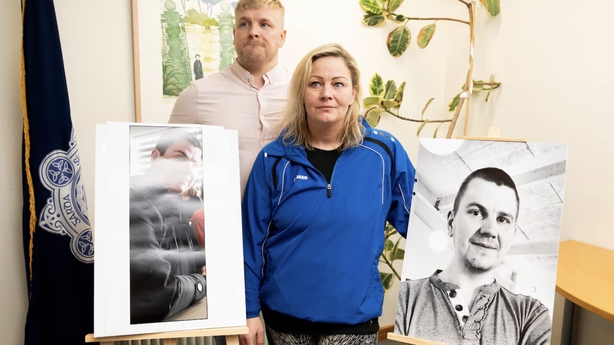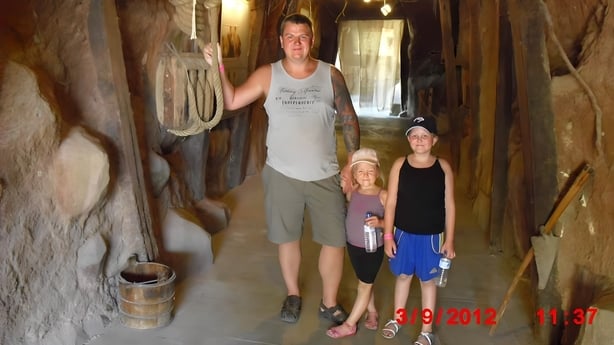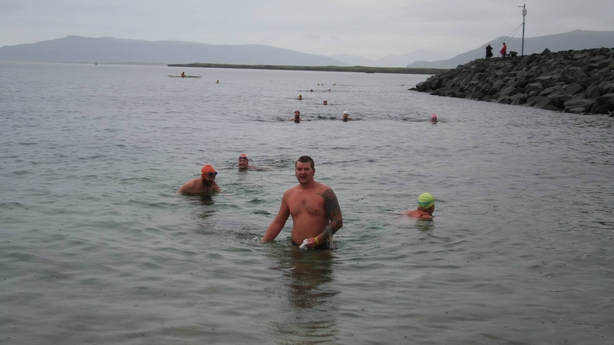The old adage goes, never judge a book by its cover, but what happens when hundreds of thousands of people refuse to heed this warning?
How do you make the public, the media, and even the police toss aside their judgements about drinking, gambling, and financial debt and dig a little deeper? Especially when this judgment or bias could make or break an active missing persons case.
This is the dilemma faced by the family of missing Icelandic poker player Jón Jónsson when he disappeared in February 2019.
If you're new to this investigation, Mr Jónsson was last seen exiting the Bonnington Hotel on Swords Road in Co Dublin. He has never been heard from again.
RTÉ and RÚV, the public service broadcaster in Iceland, in conjunction with the Jónsson family, have created a six-part podcast series to try and bring Mr Jónsson home and answer the question and namesake of this podcast - Where is Jón?
In that process, startling revelations will be made about the conduct of An Garda Síochána, the world of poker and the hidden struggles faced by families of the missing.
But first, the podcast creators must examine all possible explanations for what could have happened to Mr Jónsson, including the possibility of suicide or a tragic accident.
Read on to discover what they found in episode four - Narrowing the Focus - or save time and start listening above.
Aron
We know from previous episodes that Jón Jónsson was father to two daughters from his first marriage, but once he met his partner Kristiana Guðjónsdóttir two new children entered his life.
Now, there are many stereotypes about stepparents, they move in and take over a household, upending the lives of their partners' children in the process. Mr Jónsson (once again) did not match up with stereotypes.
Ms Guðjónsdóttir’s youngest son, Aron spoke to the podcast and made clear that Mr Jónsson was most definitely a father of four.
He moved into their household when Aron was just seven years old. He described Mr Jónsson as "more of a dad than my real dad."
He told the podcast that Mr Jónsson was a loving, caring presence in his life who was always "open to admitting what he had done wrong and right."
He was a source of safety to these children, so it’s understandable that watching their father figure be reduced to some missing gambler by the media took its toll.
"They believe what's not true, and they don't realize that that can still hurt the people that knew him," said Aron.
"But the world deserves to know that he was amazing, and he would have never left us. Not on purpose."
A lot of people believe that just because he did poker that he did illegal things, which he did not. And Because people don't know him the way we do, and they don't know his character, they make up assumptions
- Aron
Families of the missing
One of the first things that pops into people’s heads when someone goes missing, especially if any form of addiction or substance is mentioned, is suicide.
When news of Mr Jónsson’s disappearance broke in early 2019, Dublin natives Willow and Eamonn Connolly knew they had to help.
They grew up near the Bonnington Hotel, so knew the area inside out, but they also had a personal connection to the story.
They were avid poker players who nearly participated in the Dublin Poker Festival that year. And unlike most people (thankfully) they knew exactly how the Jónsson family felt.
In 2007, their son Christopher went missing in Galway; after five days of searching, they found him. Tragically, he had died by suicide.
The pair joined the search effort for Mr Jónsson and quickly bonded with his mother, Hanna Björk, as Mrs Connolly explained to the podcast.
"We just liked them as well. And I empathise with Hanna as the mammy. Very much so. And my heart just went out to her."
Mr Connolly said they contemplated whether Mr Jónsson like their son, had lost his life to suicide, as there was no trace, no clues left in his wake.
And they knew the troubles that can follow someone embedded in the poker scene…
We got help when we were in Galway looking for our son. And it was a great help for us for somebody else to be able to guide us on where to look. And to have somebody else help you out that way because you're feeling so lost at the time
- Willow Connolly

(Pic: Gareth Chaney/Collins)
Back to the future
To fully dissect whether Mr Jónsson chose to remove himself from this world, the podcast producers had to look at his final intentions.
In a nutshell, was he planning for the future or tying up the past?
Around the time Mr Jónsson went missing, he had been helping his ex-wife Nina deal with her second divorce.
Unlike most former spouses, Mr Jónsson was devoted to helping Nina through this hardship.
"He said, it's okay, we will do this together, it's okay. So he was always there for us and we counted on that."
Nina told the podcast that the couple had discussed their daughter Júlía Sif Jónsdóttir moving in with her father for a while.
The podcast team also uncovered further evidence to suggest he was looking forward to the next stage of his life.
Facebook messages seen by the team indicated that he was considering buying property and even building homes with his brother David Karl Willem.
He had bought the taxi he had been leasing for three years, and applied for his full taxi license; emails sent just before he went to Dublin indicated he had been checking on his application status.
A few weeks after Mr Jónsson went missing, he was finally granted his full license.
Why is this information so important? Because research and data around suicide suggest that those who die by suicide feel they have no future, these actions would suggest the opposite to be true of Mr Jónsson.
We were talking a lot and we were deciding to raise the girls together, maybe Júlía could live with him like a week at a time and I remember he came here like two days before he left and we were talking about the future…
- Nina, former wife

Lost at sea
In an investigation of this kind, all possible avenues need to be investigated because no remains have ever been discovered if Mr Jónsson died by suicide, the team deduced the only real possibility involved drowning.
But Mr Jónsson had never been to Ireland before and did not have a phone when he went missing, so finding water would have been pretty difficult.
Now, the nearest river to where the Bonnington Hotel is the Tolka, but Mr Jónsson was last seen walking in the opposite direction to this river, and it was searched when he went missing.
But if he did get into a vehicle on the Swords road where he was last spotted as gardaí suspect, he could have travelled to the nearest sea, which was Dublin Bay.
Deputy Officer in Charge of the Coast Guard in Howth, Robin Blandford, explained to the podcast that most bodies that enter Dublin Bay are brought across the Irish Sea towards Wales and Blackpool, where they are recovered afterwards.
A body will usually sink to the floor of the ocean for about two weeks before it floats back to the surface.
But by this point, nature takes its course, and the sea life will eat the corpse, leaving a skeleton for recovery.
From a personal perspective, Mr Jónsson’s family said he loved the water and was a strong swimmer, so arguably, it would be strange to end his life in a place of joy.
Also, from a cultural angle, only 3.5% of suicides in Iceland happen by drowning, so for an Icelander, it would be an unusual way to die.
About 20% of people who go missing in Dublin Bay are never found, so the golden search window of the first 48 hours after someone goes missing is critical.
Why then in February 2019, were the Coast Guard in Dublin Bay never contacted by gardaí? Hit play on episode four above to find out…
I would think now, by this time, either something has been found either locally or, on the west coast of the UK, somewhere, or Wales. But that's if he did end up in the water
- The officer in charge of Howth Coast Guard, Colin Murray
House of cards
Mr Jónsson’s former wife did not like his poker habit, which was a small factor in their decision to divorce.
Before he was treasurer for the group of Icelandic players that travelled to Dublin, he owned his own poker club.
He opened the club in 2009 with a club in Keflavík, near the international airport, and named it Ásinn - The Ace.
His sister Þórunn briefly even worked at the club, but she told the podcast she could tell her brother had developed a problem.
"From before he started his own gambling club he already had a gambling problem and the club was just a way to make it more easier for him to play poker… I think and to make some money from the other people that were playing poker with him…"
While playing poker is not illegal in Iceland gambling is so if you play for money, that’s breaking the law, which is why the poker community in Iceland is underground.
But Mr Jónsson’s club never found its feet and after a brief revival in 2014, it shut for good. However, it was here that he met his longterm love, Ms Guðjónsdóttir.
Mr Jónsson owed money to the government, a private debt-collecting agency and a poker club when he disappeared. Overall, he was around €29,000 in debt, but with his new taxi and taxi license he could double his earnings and rent out his taxi for extra income.
He also had already begun paying off some of his debts and setting up payment plans, based on emails seen by the podcast creators.
Does this sound like someone who wanted to disappear?
He was a very hard worker… So he should have accumulated some savings or, you know, property or something, and he didn't have anything… Because everything extra, everything disposable that didn't go to paying bills, I think, went to poker - Þórunn, sister

Outside sources
After a couple of months of fruitless searching the case had become known throughout Ireland, but not all attention was welcome.
The Jónsson family received a barrage of messages from mediums and clairvoyants claiming to know what happened to Mr Jónsson and were forced to issue a Facebook statement asking people to stop.
However, not long after this message was sent someone who had grown to know the family experienced something otherworldly in Thailand.
A woman who has asked to remain unnamed offered the Jónsson family her home while they were in Dublin in 2019. She had already participated in search efforts to find Mr Jónsson.
During this time, she set off on a preplanned yoga teacher training course in Thailand. A week into her retreat, she opened up to some other participants about Mr Jónsson’s disappearance, but she was not prepared for what happened next.
A young IT analyst from the UK suddenly threw his head back and entered a type of psychic trance. When the vision stopped, the man was left sobbing with a pounding headache.
What did the group do? They asked him to sketch what he had seen… the alarming details can be found on a streaming service near you.
This information would follow this Irish woman home from Thailand, so much so that she ended up reporting the incident and giving the sketch to the family and the authorities.
Suddenly he threw his head back and started having this kind of psychic experience. He said that he could see Jón, he could see him being kind of manhandled, that two men were putting him into a car, it was a certain type of car, a certain type of colour, with tinted windows, and that he saw him being driven away
- Anonymous female source
Conclusions
After all that, where does that leave our investigation? Well, back in May 2019, the Icelandic police flew to Dublin to speak with gardaí.
At that time, the gardaí had run several media campaigns and dedicated a lot of manpower to the search, but with no new information, they said there was little else they could do.
In their opinion, Mr Jónsson probably went into the sea to die by suicide, despite no evidence to support this theory.
But with no remains ever found, it is also unlikely Mr Jónsson died by accident, or his body would likely have been found.
By the end of this episode, only two possibilities remain as to what happened to Mr Jónsson: He left his old life behind to start afresh, or he was murdered.
Next week, the podcast producers unpack both of these theories in the hopes of answering the question behind this podcast: Where is Jón?
But my feeling as a policeman, I didn't see any indication that he would harm himself. It's possibility that he went to the sea. That is a possibility, you can never say that it's not. But I would say that either someone did something to Jón or he chose to disappear
- Chief Superintendent, Head of International Police Cooperation, Karl Steinar Valsson
If you have any knowledge or information on the disappearance of Jón Jonsson, please contact us immediately and in confidence via documentaries@rte.ie
You can also send us anonymous information or tips via a link on our website

